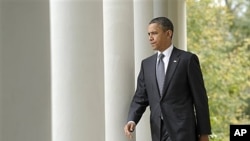As President Barack Obama welcomes this week's European debt-relief agreement, the White House says he will go to the G20 summit in France able to point to some progress in fixing the U.S. fiscal situation.
In reacting to the European deal, Obama said the U.S. looks forward to its "full development and rapid implementation" as Europe and the U.S. work together to sustain recovery and put people back to work.
At a press briefing, White House Press Secretary Jay Carney was asked if Obama's difficulties working with Republicans would undermine his authority to lecture European leaders or press them about the speed with which their deal moves forward.
Carney acknowledged "gridlock" with Republicans on the president's $447 billion jobs bill, and concerns about the ability of a bipartisan congressional committee to achieve a target of at least $1.2 trillion in additional spending cuts.
But Carney said the president will be able to tell G20 leaders that he continues to push Congress to act.
"The president's message to the Europeans and broadly to all the members of the G20 is that we need to work individually as countries and collectively together to ensure that we sustain and continue the global economic recovery and to put our people broadly speaking back to work," he said.
Negotiations in the congressional "supercommittee" are intensifying as a November 23rd deadline approaches for the 12-member panel to submit recommendations.
Obama has called for spending cuts even deeper than the $1.2 trillion target, but says they must deal in a balanced way with long-term deficit and debt and not harm the middle class.
However, the White House and Republicans continue to disagree on the question of taxes and the president's call for wealthier Americans to pay more to support deficit-reduction measures.
On Capitol Hill, Republican House Speaker John Boehner reacted to a Democratic proposal for $1.3 trillion in revenue.
"I don't think it's a reasonable number," said the speaker.
But Carney insisted that revenues must be part of any final deal.
"What isn't the right answer is to rule out entirely, to take off the table, revenues," said Carney.
House Democratic leader Nancy Pelosi addressed the importance that decisions made in Washington have for global economic confidence.
"The world is not waiting," Pelosi said. "The world is watching to see what we do, but events will overtake us if we do not play our leadership role in the world."
Prior summits
At previous G20 and G8 summits, Obama has been able to cite financial system reforms enacted under his administration to demonstrate to other world leaders that the U.S. is working to stabilize its fiscal situation.
However, next week's summit will take place amid ongoing "Occupy Wall Street" demonstrations across the United States, in which people are protesting high unemployment, economic inequalities, and what they call corporate greed.
The president spoke about the protests, which have drawn attention overseas.
"The protesters are giving voice to a more broad-based frustration about how our financial system works," he said during his press conference on October 6th.
As he awaits the upcoming deficit-reduction decision by the supercommittee, Obama also continues to press lawmakers on legislation he says would create 1.9 million jobs.
Earlier this month, his American Jobs Act failed to obtain the 60 votes needed for passage in the Senate, with all Republicans voting against it. Congress earlier did approve free-trade agreements the president says will help the economy.
Facing continuing Republican opposition to his overall economic policies, Obama has resorted to executive orders not requiring congressional approval, to offer Americans financial relief, in areas such as mortgage refinancing and college loans.
Though the president got some good news about the economy -- third quarter economic growth of 2.5 percent -- Carney said this was "absolutely not good enough" to significantly effect employment.





